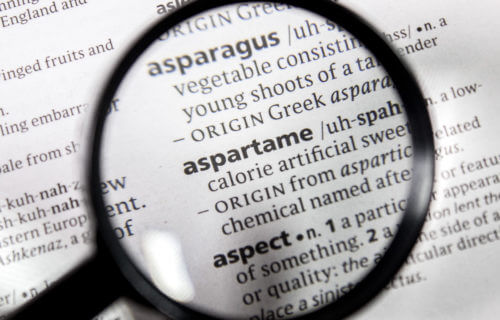TALLAHASSEE, Fla. — Aspartame is used as an ingredient in over 5,000 diet foods and beverages. Now, new research from Florida State University reports the artificial sweetener may be linked to a greater anxiety risk, an animal study concludes.
Mice exposed to aspartame exhibited anxious behavior. Notably, the anxious effects of aspartame on tested rodents extended up to two generations from the original males exposed to the sweetener.
“What this study is showing is we need to look back at the environmental factors, because what we see today is not only what’s happening today, but what happened two generations ago and maybe even longer,” says study co-author Pradeep Bhide, the Jim and Betty Ann Rodgers Eminent Scholar Chair of Developmental Neuroscience in the Department of Biomedical Sciences, in a university release.
This work was conducted, in part, thanks to previous research at the Bhide Lab focusing on the transgenerational effects of nicotine on mice. Those earlier projects indicated temporary, or epigenetic, changes in mice sperm cells. In contrast to genetic changes (mutations), epigenetic changes are reversible and don’t change the DNA sequence. Still, they can change how a body reads DNA sequences.
“We were working on the effects of nicotine on the same type of model,” Bhide adds. “The father smokes. What happened to the children?”
How aspartame affects the body
Aspartame was originally approved by the U.S. Food and Drug Administration (FDA) as a sweetener in 1981. Fast forward to today, and close to 5,000 metric tons of aspartame is produced annually. Upon ingestion, aspartame becomes aspartic acid, phenylalanine, and methanol. All three of those substances are known to have potent effects on the central nervous system.

This latest research, led by doctoral candidate Sara Jones, entailed providing a group of mice drinking water containing aspartame. The water given to the rodents registered at approximately 15 percent of the FDA-approved maximum daily human intake. That dosage, which is roughly equivalent to six to eight 8-ounce cans of diet soda a day for a human, was provided to the mice for 12 weeks, but the greater study spanned four years.
Starting with directly exposed males, pronounced anxiety-like behaviors were observed in the mice through a variety of maze tests across multiple generations. “It was such a robust anxiety-like trait that I don’t think any of us were anticipating we would see,” Jones explains. “It was completely unexpected. Usually you see subtle changes.”
When the mice were given diazepam (Valium), a benzodiazepine used to treat anxiety disorder in humans, rodents across all generations stopped acting so anxious.
Moving forward, the research team plans to publish more scientific work focusing on how aspartame may influence memory. Future studies will work to identify the molecular mechanisms facilitating the transmission of aspartame’s observed effect across generations.
The study is published in Proceedings of the National Academy of Sciences.

I found out years ago through personal experience that aspartame can also affect clarity in the brain. I used it in coffee and after a while and it felt like I was trying to think like looking through cheesecloth. I got off of it and the brain fog went away. Started using it again and it came back. I’ve spoken to a few over the years who had the same effect.
I Believe heating it makes it even worse . True !
No wonder all kinds of strange effects – mice were given human dosage!!
The mice were given Aspartame equivalent to a few cans of diet cola. I’m swearing the stuff off and sticking with saccharine and sucralose for now.
This makes me very nervous.
Years ago on a flight, the guy next to me orders a coffee and says “No thank you, I’m allergic to aspartame.” when handed the pink packets. I almost freaked out, because I knew aspartame did a number on me. When I take, I am anxious as anything for no reason at all. My heart feels like it is about to jump out of my chest. I have nightmares where snakes are in my bed and I will jump on the bed, run, talk, yell all kinds of stuff in my sleep. My wife knows when I have had any aspartame even if one drink. All the seltzer alcoholic drinks do me in. Good thing I don’t like any of them.
Thank you Monsanto.
Could it be coincidental that Aspartame’s intro to society coincides with the exponential rise in gun-related mass murder? Similar coincidence with Nicotine?
I guess bringing in enough money helps when getting the worthless FDA to approve a substance that a high school taking chemistry could identify its dangers to humans.
High school student
Agree !
Stick with the classics. “Sweet N Low — wherever you go.”
Lysenko all over again. Hope to see the final study that demonstrates the actual mechanism for cellular responses to outside chemical input over time, that is translates into the modified genetics of sperm. Discovery of this will be a MAJOR finding if true.
Lysenko all over again. Hope to see the final study that demonstrates the actual mechanism for cellular responses to outside chemical input over time, that is translated into the modified genetics of sperm. Discovery of this will be a MAJOR finding if true.
A few years ago I started to get random moderate pains all over the top and outside or edge of my head/brain, this happened daily for a month before I realized a new delicious cherry soda I started drinking (Clear American) 1 or 2 a day had aspartame, I stopped drinking it and the pains stopped immediately.
The concept of the chemical reaction in the stomach is compelling.